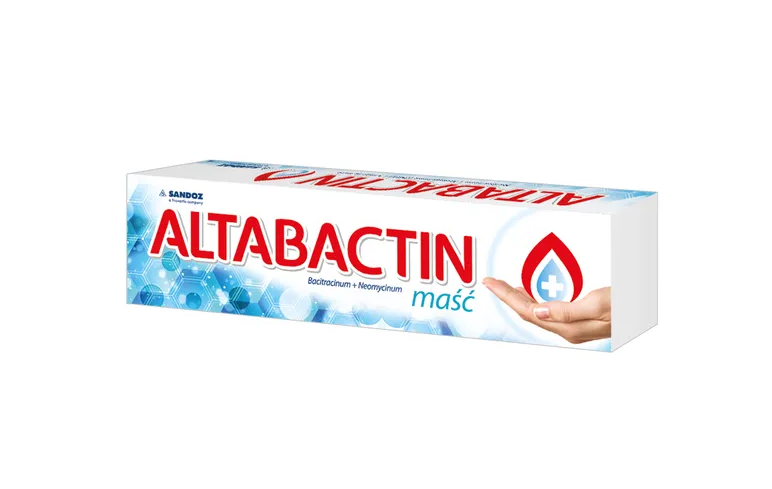Altabactin ointment, 20 g
Altabactin ointment, 20 g
Description
Altabactin
Composition
Dosage
Do not use it for more than 7 days. If there is no improvement after 7 days or the patient feels worse, you should consult a doctor.
Action
Altabactin
Indications
Altabactin
infections of small wounds, skin infections caused by frostbite and burns.
Contraindications
if you are allergic to bacitracin, neomycin, other aminoglycoside antibiotics, or any of the other components of this medicine on large areas of the skin, with severe skin damage and prolonged, due to the risk of toxic effects of the drug on the kidneys and hearing, including hearing loss; if you have severe heart or kidney dysfunction; if the patient has previously been found to have damage to the hearing organ (atria or cochlea); if the patient has a punctured eardrum (perforation), external ear ointment should not be used; for eyes and mucous membranes; for deep or stab wounds, oozing lesions; severe burns; large areas of damaged skin.
Side effects
allergic reactions, mainly in the form of contact dermatitis; 50% of people who are allergic to neomycin are allergic to other aminoglycoside antibiotics.
allergic reactions such as erythema (reddish-blue spots on the skin, sometimes with blisters), excessive dryness and flaking of the skin, skin rash and itching; harmful effects on the kidneys, hearing organ, or nervous system (vestibular nerve damage, neuromuscular blockage).
Warnings and precautions
If during the use of the drug Altabactinif an allergic reaction or secondary infection occurs, you should immediately stop taking the drug and consult a doctor. The drug can only be used on a small surface of the skin or wounds. Do not use the drug in large doses, as the active substances of the drug absorbed into the blood can cause damage to the kidneys and hearing. Avoid sun exposure and tanning (including tanning beds). during the use of the drug, as it can cause allergies to sunlight and phototoxic reactions. Store at a temperature of up to 25ºC. Protect from light. The drug should be stored in an invisible and inaccessible place for children.
Use of other medications
the patient should receive medication for general anesthesia; the patient applies: other antibiotics (medications used for bacterial infections); diuretics (drugs that increase the production of urine); opioid painkillers; muscle relaxants.
medications that can damage the kidneys and the hearing organ, such as strong-acting diuretics, such as furosemide, etacric acid; medications that can damage the kidneys, such as cephalosporins or aminoglycoside antibiotics.
Pregnancy and lactation
Use of the drug in children and adolescents
Manufacturer
Sandoz GmbH
Biochemiestrasse 10
6250 Kundl, Austria
Ask a question or inquire about delivery to your country
